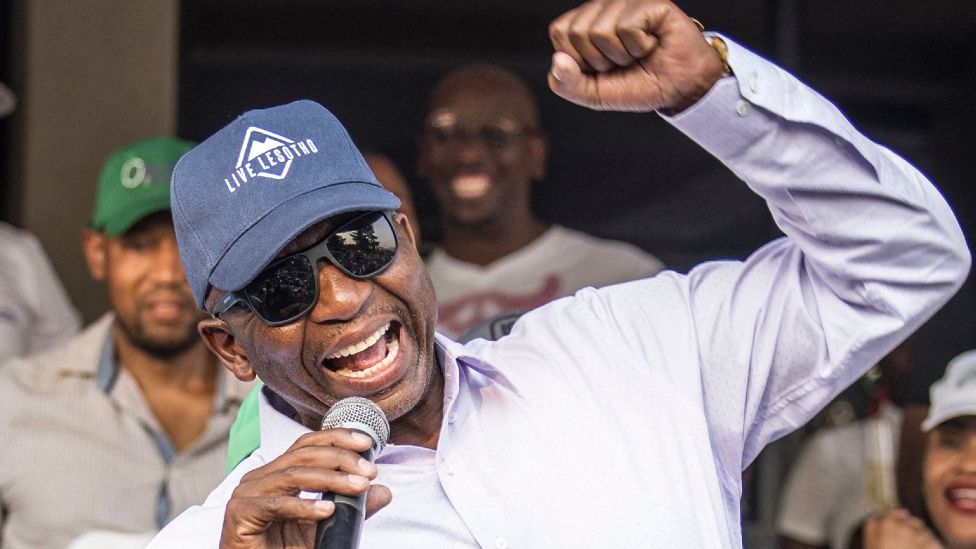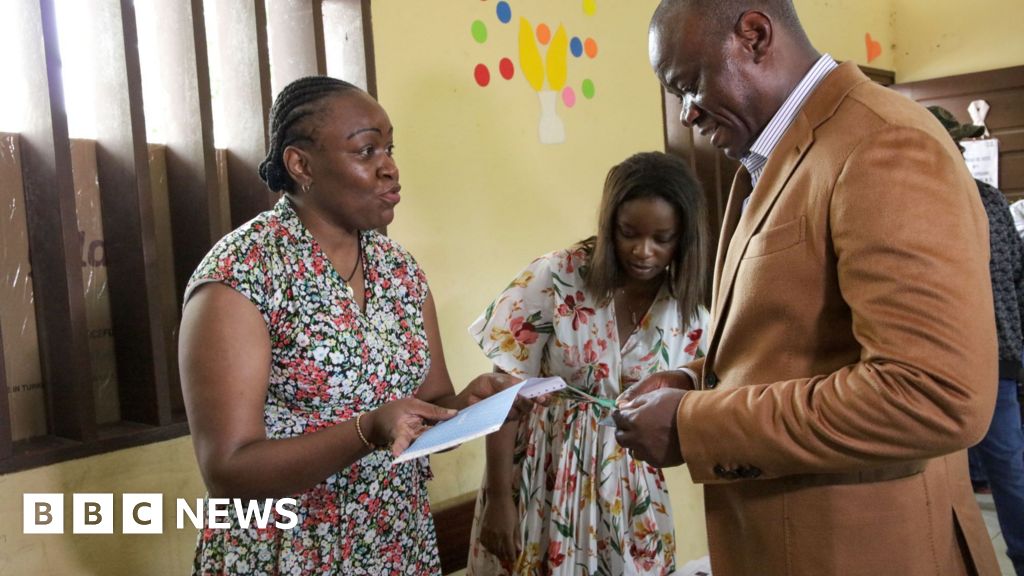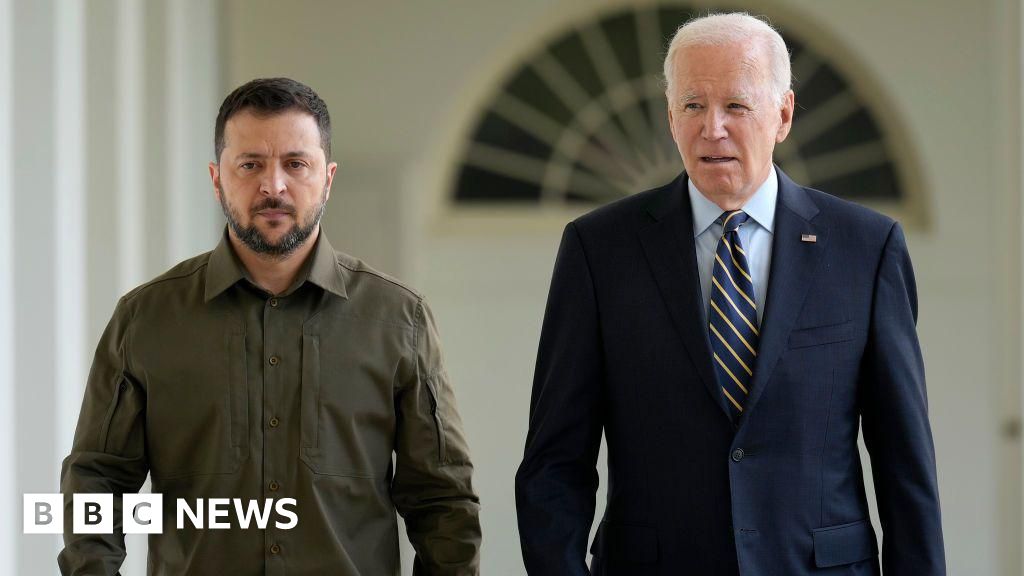ARTICLE AD BOX
 Image source, AFP
Image source, AFP
By Pumza Fihlani
BBC News, Maseru
Sam Matekane has taken many chances in his life - it is how he has been able to build a multimillion-dollar mining empire and become one of Lesotho's most formidable businessmen. But those close to him say entering politics is by far his biggest gamble.
"It wasn't an easy decision for him because politics has become poisoned. But the country was going down, the economy, everything was collapsing, and something needed to change," Teboho Kobeli, his friend of more than 30 years and business partner, told the BBC.
The 64-year-old, who until recently headed the Matekane Group of Companies (MGC) - a business empire that spans mining, aviation and real-estate development - has become the mountain kingdom's newest prime minister.
A daunting challenge, given the political and economic turmoil in the country, where no prime minister has served out his term for the past decade.
"Sam decided it was worth sacrificing himself if it saves Lesotho," said Mr Kobeli.
The diamond-mining magnate is a political novice, having started his bid for the top job with a party he launched just five months before the elections.
But does he have what it takes to change Lesotho's fortunes?
Podcaster Katleho Selatela says people are no longer afraid to speak about politics
"Sam does not like to fail," Mr Kobeli, a textile business owner, told me.
"He has a determination I've never seen in anyone [else]. When he starts something, rest assured that he will see it to the end and he will make sure it succeeds.
"What he doesn't know, he works hard to learn and makes sure to have people with expertise around him. That is what gives him his edge."
Mr Kobeli says the political arena will be no different: "He will pour everything of himself into it."
No military patrols
We met up in Lesotho's capital Maseru, a small, bustling old city whose streets highlight two of the main issues facing the country:
- Young people selling fruits and vegetables on the side of the road - a not-so-subtle sign of the lack of jobs and prospects
- A handful of labourers working feverishly to patch up pitted roads, painstakingly refilling the craters that make driving a challenge - a nod to the country's strained infrastructure.
Having covered Lesotho's fractious and sometimes tense politics over the years, the mood seems more light-hearted than on my previous visits.
It is notable that there are no military patrols on the streets and that people seem more comfortable to talk about politics when asked.
BBC
If he does for Lesotho what he has done for his businesses then he could be our saviour"
Twenty-five-year-old aspiring podcaster Katleho Selatela attested to this: "It feels like we can be critical about the government and not worry about safety. It feels like we can be proud to be Basotho again."
Another resident, retired soldier Mokaba Matlalane, put this change down to Mr Matekane.
"We have been suffering for many years and our governments have been failing us," the 72-year-old told me.
"If he does for Lesotho what he has done for his businesses then he could be our saviour."
Missed school to farm
Mr Matekane is a well-regarded businessman in the small country, which has a population of 2.2 million and is entirely surrounded by South Africa. But outside business circles he is known mostly for his philanthropy.
The Bocheletsane Combined School opened in Mantšonyane in 2019
Over the years he has built a school that offers sponsorships, hospital wards, a football stadium and started farming projects, to get people working and earning a living back in his home village of Mantšonyane.
He is the seventh of 14 children born to farmers. Village life was demanding and school was juggled between herding the family's livestock and working the fields - each child expected to help out, which at times meant missing classes for days.
With many mouths to feed in the Matekane household, his parents sent him to Maseru to live with relatives when he was old enough.
"Daddy didn't go as far as he would have wanted to in school - this is one of the reasons he feels led to help children in similar circumstances to get an education," his daughter-in-law, Mamotake Matekane, told the BBC.
Married to one of Mr Matekane's six children, she has worked at MGC for more than a decade and is now its chief operations officer, describing her father-in-law as "all business".
"He takes what he does seriously, he is results driven. He has an impeccable eye for detail, and a sharp memory and does not miss anything."
BBC
There is no underperforming on his watch"
Mrs Matekane then warned, half-jokingly: "I hope the people in government understand that about him and are ready for that. That is who Lesotho is getting.
"He is warm, giving, loyal but also believes in doing what you have said you will do. There is no underperforming on his watch."
The move to politics was an unexpected adjustment for his family.
When Mr Matekane, a grandfather of seven who lost his wife to cancer last year, called a gathering to tell them he would be forming a political party, the news was met with concern at first, his daughter-in-law said.
"One of his sisters even shed a tear. Some were worried about his safety, some about what this would do to the businesses and legacy he has built for over 30 years."
Yet he was determined, she said, telling them: "Our family have the ability to leave and go and rebuild our lives elsewhere, but what about the rest of Basotho? What about them? I have to try and do something."
'It is his game to lose'
It is a sacrifice that appears to have paid off.
Back in his village, where the infrastructure is scant, and modest homes dot the mountain slopes and valleys of the one-street neighbourhood, the people beamed with pride when they spoke of the new prime minister.
Mantšonyane residents have confidence in the new prime minister
"We have hope. I've never voted before, it didn't seem worth the time, but when Mr Matekane entered politics that all changed for me," said 36-year-old street vendor Maretsepile Kapoko.
"I believe if he was able to bring so many good things to our village from his own money, how much more for Lesotho if he is running the country," she said.
But Mr Matekane has his work cut out for him. Running the government is not a one-man show and many politicians in Lesotho are seen as tainted, experts warn.
Since independence from the UK in 1966, there have been a number of military coups, including one in 2014, and three national elections in the past five years.
For a decade none of Lesotho's political parties has garnered enough votes to form a government. As a result, the country has been run by coalitions that have proved fractious, and no prime minister has served a full five-year term.
Mr Matekane's newly formed Revolution for Prosperity Party (RFP) won 56 constituencies, falling short of the 72 for an outright majority, and invited two smaller parties into a coalition.
But as the dominant partner, political analysts believe the new PM is well placed to end the streak of short-lived terms.
"It is his game to lose," said Dr Thlolohang Letsie, head of the politics department at the National University of Lesotho.
"Two things are counting in his favour: he has the goodwill of the people and the older parties have been humbled at the polls - some are even more divided now than before."
Politics aside, the economy is in a mess. Unemployment and poverty have worsened in recent years and hundreds of thousands of Basotho are facing food insecurity.
If this was a business venture, it would be considered by some as a bad investment.
Yet those close to him say he is driven by his love for Lesotho and her people and for that he is prepared to put it all on the line.
"If he governs using his firm business ethics, delivers then he has the power to make this work," said Dr Letsie.
But he warns: "He needs to remain bold, and show leadership like he does in business."

 2 years ago
15
2 years ago
15








 English (US)
English (US)